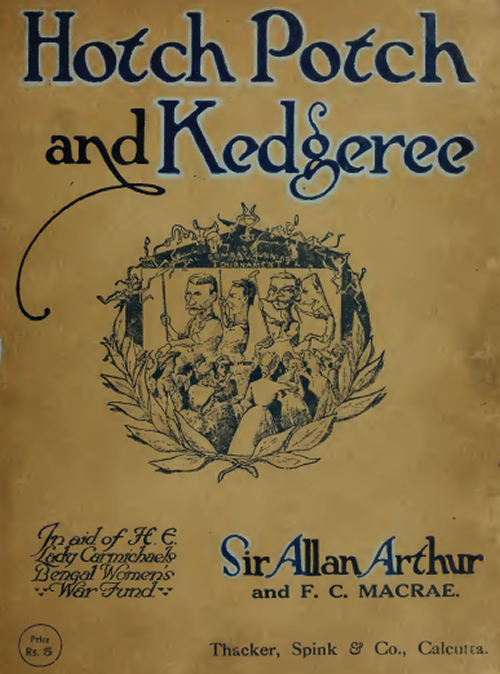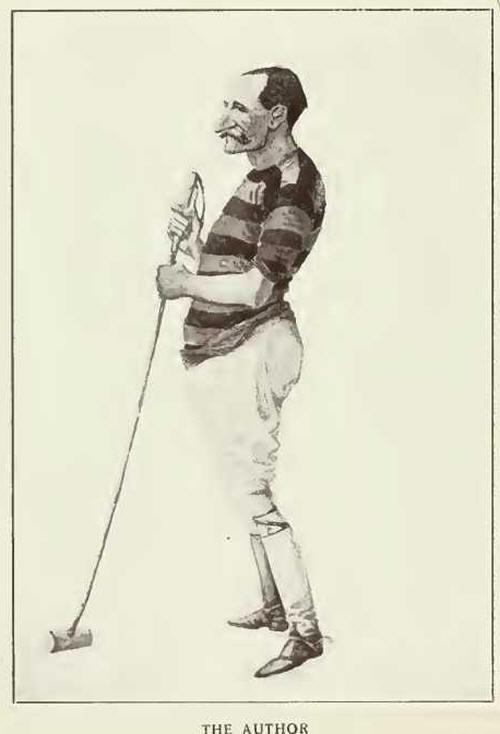|

PREFACE
Many years ago I was
present at a St. Andrew's Dinner in Bombay, at which Lord Rosebery was a
guest. He was an unexpected guest, as the P. & O. mail steamer arrived
12 hours before it was due, which it never does nowadays. An express
message was sent on board the mail to invite His Lordship to the
dinner, and, though he arrived in Bombay only a couple of hours before
the dinner hour, he duly attended the Banquet. Naturally his name was
not on the Toast List, but his countrymen were not to be denied and
insisted on his making a speech. He rose and told his audience that,
while he had been long enough in India to write a book, he feared he had
not been sufficiently long in the country to find material for a speech.
It is not to be presumed
that, in making this humorous remark, this eminent Scotsman claimed that
a short residence in India was the sole qualification for the writing of
a book, or intended to suggest that an aspirant to literary effort, in
the matter of a book, need be deprived of all hope of even moderate
success by a very long residence in this country, although in the case
of a Scot it might rub off much of the “polish” acquired by him at
Aberdeen, Glasgow, Perth or some other place in the North. In the course
of four decades, which have been decreed to be my lot in India, a vast
amount of flotsam and jetsam has floated beneath the bridges of rivers
like the Clyde and the Hooghly, upon whose banks, with a few intervals
of absence from each, four-fifths of my life have been spent. Some of
this floating stuff I have endeavoured to pick up as it glided by, with
the result that much material, containing, as I think, a considerable
amount of humour, has been gathered together and stored up, without ever
a dream of its being at any time put into print.
I would have shrunk at
any time in the past from the publicity and criticism attaching to the
writer of a book, but everything has been altered by this awful war. As
I am barred by the age limit, to my infinite regret, from joining the
glorious throng of young Britishers, who are rolling up in their tens of
thousands from all quarters of the Empire to be present at the certain
and final overthrow of foul Germany, and to whom I take off my hat in
profound admiration, and as a lame leg (to descend to the particular)
prevents me from even becoming a Volunteer in the Calcutta Scottish or
the Light Horse, it has occurred to me to do my little " bit ” by
arranging in book form and giving away for the benefit of those affected
by the war a selection from my flotsam and jetsam, which I have been
jealously guarding for my own hoarding.
When they see the
delightful words "giving away,” some of the Scots of Calcutta will be
thinking that they are going to be given the fine chance of getting a
book for nothing, but, unless they steal it, they won’t get “Hotch Potch”
and Mr. Macrae’s Sketches for nothing. What they are going to get for
nothing is what is in the book, but they have got to pay for the book
itself. To some it may perhaps appear an old-fashioned publication, but
others may find it as pleasing an investment as a National, Kinnison or
Kanknarrah Jute Mill Ordinary at a price that is not fabulous, and no
objection will be made to the rich men of the East ordering more copies
than they want, which Her Excellency will be pleased to take charge of
for despatch to the trenches.
If the book benefits the
War Fund, for which it is published, to any material extent, I shall get
my reward in having less of that feeling, which must come sooner or
later to all old “dead beats,” an expression applied in Australia to
old fellows who are no good to any one, and so I offer my humble wares
for what they will fetch to Her Excellency Lady Carmichacl, who has been
pleased to accept them, for the benefit of Her Excellency’s Bengal
Women’s War Fund, which, as most people in India know, is a fund for the
purpose of ameliorating the lot of our magnificent fighting men, British
and Indian, who are serving their King and Country in Eastern Lands,
more particularly in Mesopotamia and Persia.
I feel I have taken a
great liberty in mentioning by name many of the actors in “Hotch Potch,”
and if any of my readers, on coming across his or her name or face or
that of a friend in its pages, should take offence thereat, I would make
them my most humble apologies, and would plead that stories, sueh as are
collected in this volume, are much more entertaining if the real actors
are named.
Robert Burns sang :—
"O wad some Pow’r the gif
tie gie us
To see oorsels as ithers see us.”
All who walk through the
pages of “Hoteh Potch”—even the “Bashfu’ Bride” of my first Scottish
story, who, though apparently highly approving of me, only suffered me
to sit in her compartment for fear of “Some one waur” coming in at
Motherwell—are seen by me only through glasses of the greatest good
humour, and, if any to whom I have offered my apologies are still
unappeased, I would still plead with them that there is no one more
chaffed in the book than the author, and, if a laugh is occasionally
raised against him and his co-actors and co-actresses, let us remember
that we are being made the sport of the public in a noble cause.

INTRODUCTORY
HOW I CAME TO INDIA.
In consultation with my
advisers it has been decided that we shall have our “Kedgeree” before
our “Hotch Potch”, and it might be well to explain at the outset how I
came to India.
I played Rugby football
for Scotland in the year that I left for India, but very nearly lost my
place owing to a doubt up to the last moment as to whether I could get
through to Edinburgh or not to play in the trial match between the East
and West of Scotland. I was then in the office of a large East Indian
Firm in Glasgow and had to catch the one o’clock train in order to play
in the match. Our Senior on coming to office that day sent down word
that he wanted the “boy” (I was then the “boy” on duty) to have his
dinner in town, as he would probably be kept late in office. I went all
round the office but not one of the other boys could take my place. I
was dreadfully sick of the late hours I had been having, with no hope of
promotion and only nominal pay, so I determined to go to Edinburgh and
chance the consequences. So when ten minutes to one o’clock came, I said
to the old porter, William Gardiner, who could do just as much for our
Senior as I could, that he was to tell our Senior, if he asked for me,
that I had gone out and would be back again, so I went to Edinburgh,
played in the trial match, dined comfortably and got into the
International. I got back to Glasgow about ten o’clock and went straight
to office, and asked William if our Senior had asked for me. William
said, “Naw. He has never come out of his room syne you left. You’ve been
an awful lang time in coming back. A have na’ had ma tea and am tired o’
waitin.” So I told William to go and have his tea, and I sat down in
front of the fire and fell asleep. About 11-30 our Senior came
downstairs, woke me up, apologized to me for keeping me so late and
drove me home in a hansom, and was so pleased with my devotion to duty
that he asked me if I would like to go to India, and sent me there on
the first vacancy occurring a few months afterwards.
Before leaving for India
I told him of the incident, at which he was good enough to laugh, but,
as I was being sent to Bombay to take the place of an Assistant who had
died of cholera in a few hours, I have never been able quite to make up
my mind whether it was honesty of purpose or fear of cholera, that
induced me to make confession of my transgression.
It might not be
uninteresting if I described a small adventure we had on the voyage out.
I went to Madras first to escort a sister of mine, who was going there
to be married. At Galle, where the P. & O. steamers called in those days
instead of Colombo, a few of the Madras and Calcutta passengers,
including my sister and myself, went off in a catamaran after dinner to
say good-bye to the passengers, who had changed into the China steamer.
On the way back, and as we got quite close to the ladder of our steamer,
our catamaran capsized and we all fell into the water. Naturally I
looked after my sister, and strangely enough the danger we incurred was
not from the billows around or the sharks below, but from the young
fellows above, who clambered over the rails, and dived or jumped into
the water in their dress clothes to try and save some one. One young
fellow very nearly jumped on my head, and as in addition to the seven or
eight people originally shipwrecked there were about a dozen would-be
rescuers in the water, there was a good deal of congestion at the foot
of the ladder before we were all hauled on board. None of us got
anything worse than a ducking.
As there are so many illustrations
in this book I decided to just make this available as a pdf file
See also some of his
genealogy here |

